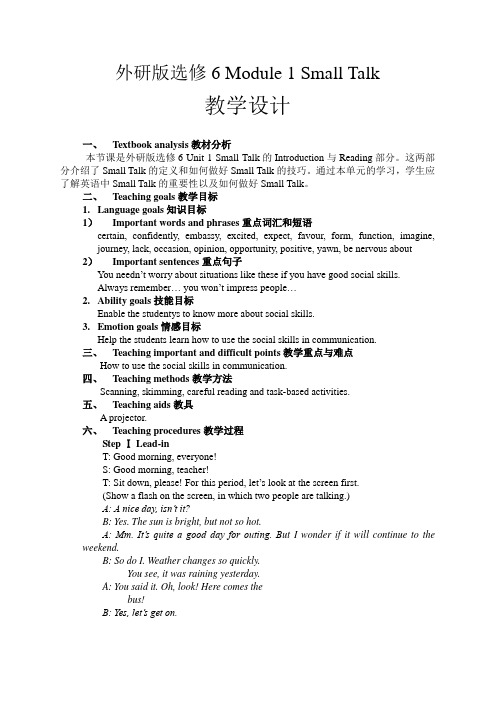Smalltalk超简明教程
- 格式:pdf
- 大小:84.02 KB
- 文档页数:14


外研版选修6 Module 1 Small Talk教学设计一、Textbook analysis教材分析本节课是外研版选修6 Unit 1 Small Talk的Introduction与Reading部分。
这两部分介绍了Small Talk的定义和如何做好Small Talk的技巧。
通过本单元的学习,学生应了解英语中Small Talk的重要性以及如何做好Small Talk。
二、Teaching goals教学目标nguage goals知识目标1)Important words and phrases重点词汇和短语certain, confidently, embassy, excited, expect, favour, form, function, imagine, journey, lack, occasion, opinion, opportunity, positive, yawn, be nervous about 2)Important sentences重点句子You needn’t worry about situations like these if you have good social skills.Always remember… you won’t impress people…2.Ability goals技能目标Enable the studentys to know more about social skills.3.Emotion goals情感目标Help the students learn how to use the social skills in communication.三、Teaching important and difficult points教学重点与难点How to use the social skills in communication.四、Teaching methods教学方法Scanning, skimming, careful reading and task-based activities.五、Teaching aids教具A projector.六、Teaching procedures教学过程Step Ⅰ Lead-inT: Good morning, everyone!S: Good morning, teacher!T: Sit down, please! For this period, let’s look at the screen first.(Show a flash on the screen, in which two people are talking.)A: A nice day, isn’t it?B: Yes. The sun is bright, but not so hot.A: Mm. It’s quite a good day for outing. B ut I wonder if it will continue to the weekend.B: So do I. Weather changes so quickly.You see, it was raining yesterday.A: You said it. Oh, look! Here comes thebus!B: Yes, let’s get on.T: Now, let’s look at some questions on the screen.1.Where does the conversation take place?2.What’s the topic they talk about?3.Is the topic important or not important?4.Is the conversation serious or informal?Sample answers:1.At a bus stop.2.Weather.3.Not important.rmal and friendly.T: As for this kind of informal and friendly conversation about unimportant topics, we call it small talk.T: As we can see, the topic of small talk usually comes unimportant, but small talk itself is very important. It can help us to make it easy to develop new friendships, and can also “break the ice” before important meetings or other events.But not all people are good at doing small talk. It is difficult not only for English learners, but also for native speakers of English. Because making small talk means talking about everything, that means you should have a wide vocabulary in almost every topic. You may have good vocabulary in some topics, but as for some unfamiliar topics, your words will be limited. Therefore, some social skills for making small talk appear very important for us. So, in this period, we will learn some of the social skills.[设计说明]此部分一方面旨在引出Small Talk的定义,使学生明白什么是Small Talk;另一方面让学生明白Small Talk不仅是重要的,也是不容易做的,从而引出social skills在做Small Talk中的重要性,为本节课讲social skills打下铺垫。

Module 1 Small Talk 话题导入您有没有这样一种经历?在朋友的宴会上、在乘坐火车时,或在旅途就宿的旅舍中,面对陌生的朋友,出于胆怯、拘谨或是别的原因,相视无语,无从谈起,双方都觉得尴尬窘迫。
在这种场合下,就需要我们用闲聊技巧打破僵局(Break the ice),谈谈天气、论论影视人物、议议体育运动、交流一下网络见闻等等,用这些我们都感兴趣的话题让双方增进了解,在轻松、和谐的氛围中度过相聚在一起的美好时光,永远记住:Small Talk makes big time!背景知识Small Talk:就是light chit chat,可以理解为闲聊。
在工作场所,Small Talk不仅可以打破见面时的冷场、避免尴尬,而且是用来构建Rapport (和谐同事关系)的重要工具。
应该说,Small Talk的话题非常广泛。
当天的天气和交通是随手拈来的话题;各地新闻、比赛结果也可以拿来小小地评论一下;如果有心,你会知道同事们的爱好,在学习、生活方面有没有困难,关心一下也是很好的话题。
至于旅游度假的见闻,更是相当好的Small Talk话题。
有时,甚至学习中的压力和困境,拿来消遣一下也无妨,或许你会得到意想不到的建议和帮助。
Small Talk可以用在生活的方方面面。
譬如在等公共汽车时,在购物时,遇到邻居时,都是Small Talk的良机。
从这个角度来说,Small Talk也是构建和谐社会的一个重要工具。
Small Talk一般是由身体语言开始的。
相遇时双眼对视以及友好的微笑暗示着可以Small Talk。
Small Talk大致可以分为五个主要步骤:问候,引入话题,扩展话题,发出结束信号,再见。
刚开始时,可以从简单的自己熟悉的话题开始,再慢慢试试其他话题。
话题引入后,会有几个来回的交流。
如果对方有兴趣,交流的回合会适当地多一些。
由于Small Talk的性质(地点、时间等)决定了它所用的时间很短,也就1到5分钟左右,话题不可能很深入地讨论下去。


英语Small Talk 的小技巧何为small talk?Small talk: Conversation without real meaning; conversation without any particular purpose; conversation about general subjects; conversation one starts with unfamiliar people in order to be more involved; conversation used to make friends with new people; conversation used to make the atmosphere better.所谓small talk,就是“闲聊、寒暄”的意思,指没有具体意义的对话;没有特殊目的的对话;关于大众话题的对话;为了进一步融入而展开的与陌生人的对话;为了结交新朋友而展开的对话;为了使气氛更融洽而展开的对话。
Good topics(适合的话题)1. How was your flight or train ride? Perhaps the first question you would ask them, out of politeness.旅途如何?这可能是你首先该问的问题,比较礼貌。
2. How is your hotel? If they have already checked into a hotel, you can ask if their accommodations are acceptable to them. Just another polite question.你的旅馆如何?如果他们已经入住的话,你可以问问他们觉得住宿是否可心,这又是一个比较礼貌的问题哦。
3. Do you play any sports? / Do you play golf? This is a good question to ask Western businessmen especially. Most of them do play golf - it has become very, very common in recent years. Others might play tennis, squash or basketball. Most Western women do yoga or at least go to the gym.你做什么运动吗?你打高尔夫吗?这个是可以问西方商务人士的很典型的话题。

Module 1 Small TalkReadingHow good are your social skills一、课标解读本节课响应素质教育的要求,主要采用了任务型语言教学模式,体现教师为主导,学生为主体的特点。
通过一系列任务的完成,提高学生用英语获取信息、、处理信息、分析问题和解决问题的能力,特别注重提高学生用英语进行思维和表达的能力;同时.,能根据话题要求与人交流、合作,共同完成任务;使用适当的语言形式进行描述和表达观点、态度和情感。
因此,在阅读教学中,教师应调整教学策略,利用阅读契机,提高学生整体英语水平和综合素养。
二、教材分析本节课的内容是高中教材选修六第一模块的Vocabulary and Reading部分,本模块的话题是闲聊,教材通过对small talk的不同定义引出话题,然后通过设计不同交际情景来提高学生的社交技巧。
课文以不同方式呈现了词语和表达,训练学生学会运用文章提到的社交技巧组织会话。
本节课是模块的阅读课,文章脉络比较清晰,教师可在充分利用教材资源的基础上,结合学生的实际情况设计教学活动,引导学生通过阅读文章学会根据起始段落预测文章出处,帮助学生有效地掌握关键词汇,培养阅读技巧,学会使用文章中的技巧进行交流。
三、学情分析作为高二学生,经过几年的英语学习,已经具备了一定的词汇量和阅读理解能力,能够读懂本学段课标要求的文章。
但我们所面对的学生是普通生,总体英语水平不高,自主探究的能力也比较差。
在组织教学活动中,注意从简单的问题入手,逐步引导学生完成任务,使每个学生都能体验到成功的乐趣。
本节课话题与学生的日常生活关系比较紧密,学生可能会比较感兴趣。
在教学中注意循序渐进地引导学生利用不同的阅读方法,获取信息和语言输出的能力。
四、教学目标知识方面:通过读课文完成设定的阅读任务,使学生能使用速读、略读、查读、预测、猜测词义等阅读策略理解文章的主旨大意,学习分析课文中的篇章结构。
并让学生能借助语境排除词汇、语法障碍,理解语篇意义。